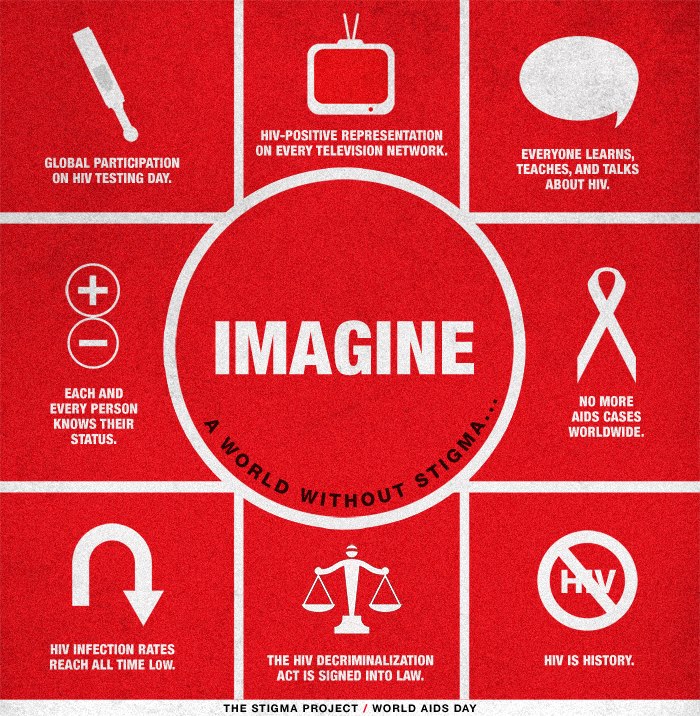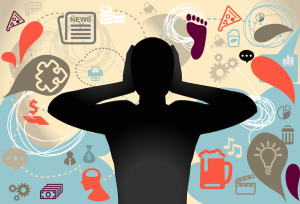
Credit: The Stigma Project
Back when I attended religious services, the topic of HIV would sometimes come up. And the speaker on the stage would say something like, “Following God’s principles can protect us from illnesses like these.”
That’s really where the problem with HIV stigma lies—it’s blaming and shaming. Religious rhetoric often paints gay people, drug users, and promiscuous people as the sources of HIV infection, sometimes going as far as to say that HIV is a punishment from God.
Even beyond a religious context, HIV is one of the most feared and misunderstood viruses in recent history.
Ignorance about HIV and AIDS has lead to stigmatization of people with the disease and the testing associated with it.
The stigma affects not only HIV-positive people themselves, but also the people around them.
The Blame Game
The stigma against HIV-positivity is fueled by the fact that when it was first discovered in the 80’s, no one knew how the virus spread to humans. Because early signs of the virus could be traced to Africa and many of the new infections at the time were among gay men, Africa and homosexuality came to be associated with the HIV virus.
Even now that HIV infection clearly happens to people of every race and sexuality, the public’s early associations of HIV with Africa and homosexuality have not faded. HIV is still sometimes painted as a “gay” disease or a “black” disease.
The Shame Game
Shame is used to attack people with HIV on an individual level. For instance, women in Mozambique are getting shamed and blamed for infecting their husbands with HIV even if they haven’t slept with other men.
Society often blames HIV infection on lifestyle choices, and this stigma gets stacked on the shoulders of those living with the virus. But like any other illness, the problem of HIV transmission is not resolved through the use of shame.
Acknowledging the risks of HIV infection without shaming those living with the virus is more productive. If there weren’t a cloud of shame around HIV infection, people wouldn’t avoid getting tested out of shame, fear, or ignorance.
We want people to be proactive about their health – not too ashamed to understand it.
Why We Should Have Come Farther Than We Have
By now we should know better than to assume that people get HIV by being promiscuous or gay, even when it comes to HIV-positive people who are promiscuous or gay.
We should have also grown past the need to treat people with HIV like untouchables, since safe sex practices and the virus’ inability to survive in open air can prevent new infections.
People who are already infected with HIV can receive treatment and live a long time without getting AIDS, meaning the disease is not as much of a death sentence as it used to be.
So why do people with HIV still face rejection from caregivers, family members, and intimate partners?
The Blame and Shame Game Still Negatively Impacts Everyone
People may avoid educating themselves about HIV for fear of having to disclose they have it if they find out they do.
Others may not get tested to avoid others assuming they have HIV and are no longer eligible intimate partners.
This can lead to unwitting transmission and failure to detect HIV early on and get treatment.
Furthermore, people who believe the hype that HIV/AIDS mainly affect black people, drug users, or gay people need to wake up and get tested if they are sexually active or otherwise at risk for HIV/AIDS transmission.
The virus does not discriminate, and anyone can have it.
Some Ways to Have a Healthier Attitude Toward HIV
A culture of fear and shame just lead to ignorance, which is dangerous when it comes to public health concerns. When people don’t know or talk about an illness due to shame, they don’t know or talk about its treatment or ways to avoid it either.
Adopting a healthy and productive attitude towards HIV involves getting educated, educating others, and being aware of your risk factors. It also means recognizing that HIV can lead to devastating illness without isolating those who suffer from it.
1. Learn about HIV and how you can get it.
There are lots of misconceptions about how you can get HIV. Some people think it’s possible through kissing (rarely happens and only if there’s bleeding) or that it can only be through penetration – neither is true.
HIV is transmitted through certain body fluids – blood, semen, pre-cum, vaginal fluids, anal mucous, and breast milk. So any time you have vaginal, oral, or anal sex with your partner, you’re getting in contact with those body fluids.
And if you’re having sex with someone with HIV without protection, you may not get it the first time but you may later depending on if you have hard to notice rips or sores . Check out the resources at the end of this article for more information.
2. Get tested regularly.
If you engage in sexual activity, share needles, or have other risk factors, it’s important to get tested for STI’s in general as well as for HIV. Your primary physician, gynecologist, and local Planned Parenthood can provide tests.
Since it can take up to 6 months after the last time you had sex for HIV to show up, it’s important to get tested regularly. Though the CDC recommends getting tested as part of your annual routine medical checkup at the very least, talk to your health care provider about how often you should get tested and consider your risk factors for HIV infection.
3. Ask your sexual partner to get tested.
You may even choose to get tested together to make it clear that you trust your partner and want to stay healthy.
Getting tested means being mutually involved in the health of your relationship. It shouldn’t be used or seen as an accusation of cheating or a lack of trust.
4. Have your friends go get tested with you.
Your friends may be afraid of a positive result or the stigma attached to getting tested. Getting tested with your friends can provide you all with emotional support, which is especially needed if a test comes back positive.
By talking openly about HIV and treating it like any other illness instead of a scarlet letter, we can focus on productive ways to treat it, minimize infection, and support people with HIV/AIDS.
And hopefully, one day soon, we’ll be treating HIV/AIDS like it was cancer – a disease whose patients need support and treatment, not shame and blame.
Resources:
- Center for Disease Control (CDC): http://www.cdc.gov/hiv/, http://hivtest.cdc.gov/
- AVERT: http://www.avert.org/
- AIDS.gov: http://aids.gov/
Jarune Uwujaren is a Contributing Writer for Everyday Feminism. A Nigerian-American recent graduate who’s stumbling towards a career in writing, Jarune can currently be found drifting around the DC metro area with a phone or a laptop nearby. When not writing for fun or profit, Jarune enjoys food, fresh air, good books, drawing, poetry, and sci-fi.
Search our 3000+ articles!
Read our articles about:
Our online racial justice training
Used by hundreds of universities, non-profits, and businesses.
Click to learn more
Most Read Articles
- « Previous
- 1
- …
- 30
- 31
- 32



















